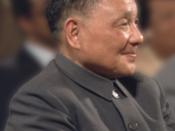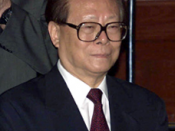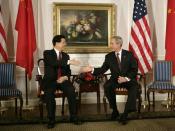Within the next year, China's president and party general secretary, Jiang Zemin will step down and make way for a new, younger-generation political leader. The man currently expected to replace him in office is Hu Jintao, a politician whose political beliefs, ability, and character remain largely unknown and untested. This scenario
provides valuable insights into the workings of the Chinese political system and the mechanisms by which powerful politicians are able to rise to power and legitimate their
rule. By looking at political succession in China, and particularly Hu Jintao's attempts solidify his claim to Jiang's position and to legitimate his power, the dynamics of Chinese political maneuverings become more clear.
This paper will explore the consequences of the fact that China lacks an institutional mechanism that governs the transfer of power. Coupled with a Confucian tradition of strong central leadership and a generation gap between the incoming and outgoing rulers, China's political structure demands that potential leaders work hard to legitimate themselves and secure their credentials before the leadership struggle.
Hu Jintao's ascent to power, and his bid to assume the positions of president and party
general secretary provides a particularly relevant example in which to explore these themes.
With no established mechanism for succession, every change in China's leadership is interesting for its novelty and the potential for spectacular mishap. This lack is one of the major failings of the Chinese political system. Describing this, Frank Ching comments,
[T]he party has not solved a fundamental problem: the establishment of institutions that will ensure a peaceful transition from one leader to the next. A country cannot be stable if it has to undergo a crisis each time
there is a change of leadership. Only institutions, not individuals, can provide such stability. Jiang's highest priority should be to ensure...


